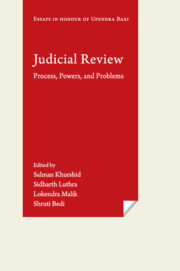Book contents
- Frontmatter
- Contents
- Foreword
- Editors' Note
- Introduction
- 1 The Inadequacy of Judicial Enforcement of Constitutional Rights Provisions to Rectify Economic Inequality, and the Inevitability of the Attempt
- 2 The Interplay of Law and Politics in India
- 3 Beating the Backlog: Reforms in Administration of Justice in India
- 4 Judicial Review: Perspectives and Reflections for the Twenty-First Century
- 5 When ‘Creeping Jurisdiction’ Goes Awry: The Social Action Litigation to Ban Surrogacy
- 6 Judicial Review and the Democratic Judge
- 7 Judicial Review: A Tool to Shape Constitutional Jurisprudence
- 8 The Baxian Bioscope on Indian Judicial Process
- 9 Judicial Activism, Courts, and Constitutional Revolutions: The Israeli Case
- 10 Democracy, Constitution, and Judicial Review: A Critique
- 11 A Minor Jurisprudence of Pathos: Upendra Baxi as Teacher and Writer
- 12 The Need for Reinventing the Supreme Court as a Constitutional Court
- 13 Appointment of ‘Distinguished Jurists’ as Judges in the Supreme Court of India: A Critical Analysis
- 14 Judicial Dissent and Judicial Review: A Functional Analysis
- 15 The Power of Judicial Review: Judicial Chutzpah or Judicial Desideratum
- 16 Judicial Review of Legislations by Tribunals in India: Law, Problems, and Perspectives
- 17 Criminalization of Membership of Terrorist Organizations in India and the United States of America: Human Rights Concerns
- 18 Article 142 of the Indian Constitution: On the Thin Line between Judicial Activism and Restraint
- 19 Sketching the Limits of Article 142 of the Constitution of India: A Constitutional Necessity
- 20 Constitutional Morality and Judges of the Supreme Court
- About the Contributors
- Index
5 - When ‘Creeping Jurisdiction’ Goes Awry: The Social Action Litigation to Ban Surrogacy
Published online by Cambridge University Press: 23 January 2020
- Frontmatter
- Contents
- Foreword
- Editors' Note
- Introduction
- 1 The Inadequacy of Judicial Enforcement of Constitutional Rights Provisions to Rectify Economic Inequality, and the Inevitability of the Attempt
- 2 The Interplay of Law and Politics in India
- 3 Beating the Backlog: Reforms in Administration of Justice in India
- 4 Judicial Review: Perspectives and Reflections for the Twenty-First Century
- 5 When ‘Creeping Jurisdiction’ Goes Awry: The Social Action Litigation to Ban Surrogacy
- 6 Judicial Review and the Democratic Judge
- 7 Judicial Review: A Tool to Shape Constitutional Jurisprudence
- 8 The Baxian Bioscope on Indian Judicial Process
- 9 Judicial Activism, Courts, and Constitutional Revolutions: The Israeli Case
- 10 Democracy, Constitution, and Judicial Review: A Critique
- 11 A Minor Jurisprudence of Pathos: Upendra Baxi as Teacher and Writer
- 12 The Need for Reinventing the Supreme Court as a Constitutional Court
- 13 Appointment of ‘Distinguished Jurists’ as Judges in the Supreme Court of India: A Critical Analysis
- 14 Judicial Dissent and Judicial Review: A Functional Analysis
- 15 The Power of Judicial Review: Judicial Chutzpah or Judicial Desideratum
- 16 Judicial Review of Legislations by Tribunals in India: Law, Problems, and Perspectives
- 17 Criminalization of Membership of Terrorist Organizations in India and the United States of America: Human Rights Concerns
- 18 Article 142 of the Indian Constitution: On the Thin Line between Judicial Activism and Restraint
- 19 Sketching the Limits of Article 142 of the Constitution of India: A Constitutional Necessity
- 20 Constitutional Morality and Judges of the Supreme Court
- About the Contributors
- Index
Summary
Significant scholarly attention has focused on the strong role played by the Supreme Court in Indian constitutional democracy. Exercising its powers of judicial review, the court will invalidate legislation if it determines it to be in violation of the basic structure of the Constitution. In the judicial appointments case, for example, it invalidated legislation that would have reformed the judicial appointments system. When there is no law, but the court finds that certain circumstances in society violate the fundamental rights of certain groups of people, it may issue its own legislative-like guidelines. It did this in the internationally famous Vishakha case, in which it created guidelines on sexual harassment.
In some cases, the court may decide that it would be more effective to retain jurisdiction in a case over a long period of time and prod the executive to create policy or design legislation rather than fashion its own remedies. Professor Baxi has famously described this as ‘creeping jurisdiction’. The court uses creeping jurisdiction, according to Professor Baxi, when it holds numerous hearings over the course of a long period of time without dismissing the case quickly. The court essentially takes over the administration of an issue or a matter to make sure that its orders to various agencies are implemented.
The court often exercises creeping jurisdiction in the context of ‘social action litigation’. While the ‘public interest litigation’ is commonly used, Professor Baxi objects to the use of that terminology because (in part) it gives too much credence to (failed) American techniques and vocabulary. In honour of Professor Baxi, I use the term ‘social action litigation’ (‘SAL’) to describe litigation brought by impacted parties or social activists seeking redressal for a violation of their fundamental rights.
The heyday of SAL was the post-Emergency era where the Supreme Court began to assert a role in rectifying the large-scale inequalities in Indian society. In an article published in 1985 for a global audience called ‘Taking Suffering Seriously: Social Action Litigation in the Supreme Court of India’, Baxi gave many examples of social activists who read media stories and brought claims to the courts. For example, a Supreme Court advocate filed a writ based on a series of articles in a national daily, the Indian Express, exposing the plight of Bihar undertrial prisoners.
- Type
- Chapter
- Information
- Judicial Review , pp. 79 - 106Publisher: Cambridge University PressPrint publication year: 2020



